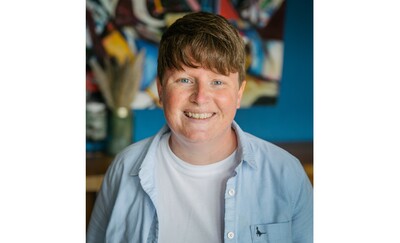In the first in a series of articles for Pride 2023, Jaskeet Briah speaks to Tarnia Elsworth, director and financial adviser at TP Financial Solutions, about her experience working in the advice profession as a member of the LGBTQ+ community.
As an openly gay adviser, Elsworth's career hasn't been adversely affected due to her sexuality. By contrast, her business attracts more LGBTQIA+ (lesbian, gay, bisexual, transgender, queer, questioning, intersex, or asexual) customers resulting from visibility of her family life online.
"I'm married to a woman, so people feel we're more inclusive and more open to people with slightly different lifestyles, therefore we naturally attract those customers," she explains.
Tarnia Elsworth
Founded in 2019 by Elsworth and her wife, Annabel Lumsden, TP Financial Solutions uses family images of the couple and their children in all online marketing: "People want to feel represented and they feel more comfortable speaking to people who are potentially like them or share the same values as them.
"We very openly put that we've been to Pride and we openly share big milestones, like our wedding anniversary and celebrations as a family, to convey who we are as people rather than just as financial advisers."
Elsworth notes that this messaging is core to the business, and ultimately attracts like-minded clients.
In fact, Elsworth has dealt with more remarks about her gender than her sexuality: "I've never had any issues in the industry being gay. I've had more comments about being a woman than being gay, like ‘whose secretary are you?'."
However, she adds that more openly gay advisers in the industry will tackle this mindset and allow for diverse representation when business decisions are being made, without being at the expense of minorities.
To encourage industry peers to speak up, who are either closeted or not confident in speaking to clients about their own personal lives, Elsworth has often been asked as a member of the Quilter network to speak at events as an openly gay adviser.
Rainbow washing
Support from the wider industry is key to boost inclusivity across protection, albeit through recruiting individuals from a range of backgrounds or launching support groups for LGBTQ+ or ethnic minority employees.
"The protection industry as a whole sometimes rainbow washes. Every Pride month, everybody turns their logo into a Pride flag because people want to be seen to be doing something," Elsworth says.
Although she commends these actions for raising visibility, Elsworth begs the question of what these businesses are doing beyond this to support colleagues in the LGBTQ+ space, as well as making customers in this community feel that financial services is for them.
To dig deeper, Elsworth recommends that businesses themselves attend local Pride marches and events or to support Pride financially through charitable donations to make a tangible difference.
Protection firms can also produce blogs or articles that demonstrate that protection doesn't discriminate against sexuality. This includes publishing case studies with real-life stories of same-sex couples who have benefitted from a policy to showcase financial services "is a place for everyone."
"Have it on your radar and don't fall into the trap of referring to a client as Mr and Mrs - mix it up a little bit; sometimes say Mr and Mr," she adds.
Improving customer support
As a member of the industry, Elsworth doesn't view her identity as an obstacle in taking out a protection policy due to her knowledge of how the products work. However, this isn't the case for all customers, therefore the onus is on the protection industry to improve engagement with clients.
"We come across customers who see barriers with financial advice, especially protection advice. If they think it's difficult in any way or if they think they're going to get pushed back, they probably won't pick up the phone," she details.
LGBTQ+ customers question whether protection is for them; they worry about what they're going to be asked and if being in a same-sex couple will affect premiums. Meanwhile, being transgender and having different medical needs is also a concern for customers when it comes to taking out a policy, although this is "not talked about widely in the industry", according to Elsworth.
"Unless you're personally an ethnic minority or a member of the LGBT community, why would it ever cross your mind to think about doing stuff for them?" she comments. "This is probably not even on most advisers' radar unless they've specifically had a client come to them with those particular needs."
However, if education around these concerns were part of CPD and literature, or even part of propositions, the protection industry would "be a bit more informed."
"There is a responsibility on intermediaries or networks, and the bigger organisations, to have that information readily available to answer those ‘what ifs', including when we're training through CPD to ensure advisers across the country understand the issues that come along with somebody being transgender from a protection application point of view," Elsworth says.
In turn, such proactive active education will help improve the client journey as well as client/adviser relationships: "Proactivity will have a knock-on effect; one person or group will do it and then everybody will follow."
"We always say to our kids that you can't be it if you can't see it. If you can't see somebody like you in these positions, why would you ever think it was for you? That is something the protection industry can work on," Elsworth concludes.
Jaskeet Briah is a reporter on Cover
This article first appeared on Professional Adviser

















